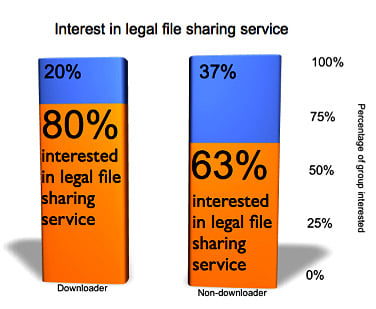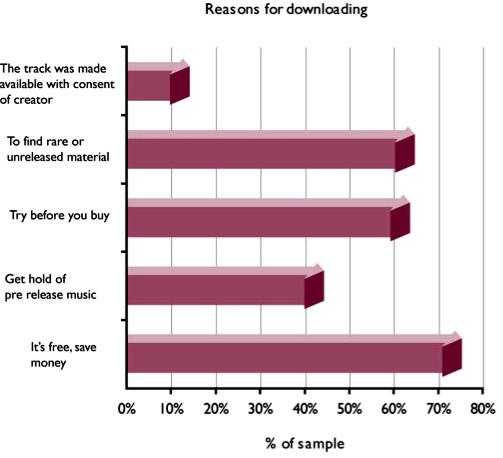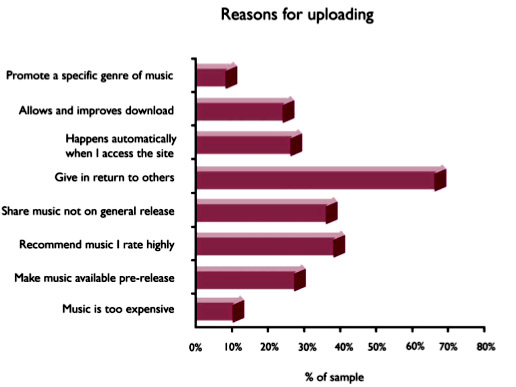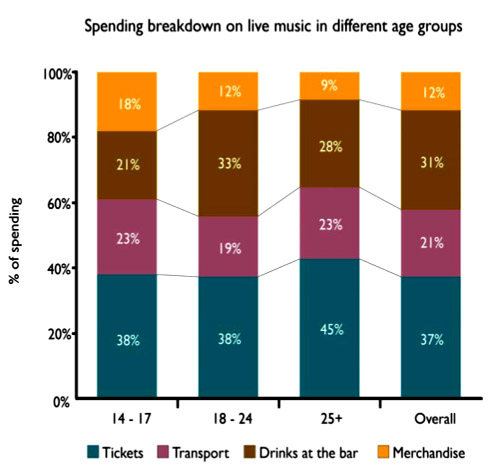Original URL: https://www.theregister.com/2008/06/16/bmr_music_survey/
80% want legal P2P - survey
Physical music surprisingly perky, BMR finds
Posted in Legal, 16th June 2008 11:56 GMT
A fascinating survey of music consumption conducted for British Music Rights has good and bad news for the beleaguered music business.
The bad news: online file sharing is more prevalent than other surveys suggest. The good news: a lot of people are willing to pay for a service that offers legal, licensed P2P file sharing. Half the people surveyed think distributors such as large telecomms companies should pay creators from the proceeds of such a license. And a surprisingly large number of people still value physical music goods, with two thirds of potential subscribers to legal P2P saying that they would continue to buy CDs.
Legal P2P services have been waiting in the wings for years, and telcos and ISPs are keen to offer innovative music sharing services that allow them to escape the fate of being in a low-margin commodity business. However, the biggest labels have feared that a service would cannibalise their physical sales; and without the ability to offer all music, telcos won't bite. The BMR survey may persuade rights holders to break the impasse.
74 per cent of people surveyed said they wanted a legal P2P service where they could "own" and keep the songs downloaded. The figure rose to 80 per cent amongst active P2P downloaders.
Enthusiasm was notably cooler when it came to paying for streaming music. 64 per cent were not interested in a file streaming service that didn't allow the punter to keep a permanent copy.
62.9 per cent of potential subscribers to a legal file sharing service still said they'd continue to buy CDs, compared to 52.3 per cent of potential subscribers to streaming services that don't let you keep the music.

In the "digital age", people still love their music collections. 73 per cent value it as their most treasured possession - higher than their mobile phone and higher than any other prompted item, such as clothes, DVDs or books.
So why are CDs, which are filling the charity shops by the lorry load each day, still valued so highly? The most cited reason was simply the desire to own a physical hard copy of the music. Over 40 per cent said they like aspects of the CD packaging. Less than 10 per cent said it was because the CD had superior sound quality.
Share the music
63 per cent acknowledge they "illegally" download unlicensed music - with the average monthly download being 53 tracks a month.

Altruism plays a large part, the survey discovered. More than two thirds said they were giving something back to the community. The reason that most frequently appears on website comments - that music is "too expensive" - was only cited by around 10 per cent of respondents.
"This suggests that respondents recognise the value in the ‘share-ability’ of music and are motivated by a sense of fairness and the principle of reciprocity – something for something illegally," BMR concludes.
Only 10 per cent of the population surveyed hasn't shared music one way or another. BMR discovered that making music available online is far more widespread - "a common activity for many respondents".

Overall, 62 per cent of respondents have downloaded music using P2P, and 52 per cent have uploaded music. The average number of CDs copied and passed on to friends 5.05 for the 18-24 age group, and 2.30 for 25+.
Big Lager profits most from live music
The average size of an MP3 collection is 1,770 tracks - of which 48 per cent have not been paid for. (BMR counts sideloading songs from a CD you've bought as "paid for"). There's a wide disparity across age groups. Not paying for music amongst the "pre work" demographics is much higher than the 25+ age group. Only 13 per cent of the MP3s in a collection of someone 25+ are not paid for, compared to 61 per cent for 14-17 and 50 per cent for age group 18-24.
Ripped CDs account for 14 per cent of the average CD collection of 150 CDs.
All of which suggests that while many people will sample MP3s to learn about new music, when they have the economic ability to pay for it, they will. So perhaps while the militant anti-copyright "freetards" make the most noise on the web, they aren't representative of the public at large.
Where does the music spending go, then, today?
Music remains a big spend for many people, with live music accounting for almost 60 per cent. Of the other 40 per cent, almost two thirds of the cash spent on recorded music goes on new CDs, 10 per cent on second hand physical music, and 26 per cent on digital downloads. But amongst the 14-17 group, digital downloads and subscriptions are much popular: with the spend on digital almost as high as on new physical CDs.
(It would have been interesting to find out how much is spent on music equipment such as iPods and accessories, but either BMR didn't ask, or asked but won't tell us).

But note how so little of the cash spent on live music goes to the creators: only about a third is spent on tickets, and 12 per cent spent of merchandising: with the promoting clawing back much of that. Almost as much - a third - is spent on drinks, and a 21 per cent on transport.
The Freetard Factor: exaggerated after all?
As with any poll where voluntary expenditure is discussed, we must be aware of the "halo" phenomenon. People consistently tell pollsters they'll vote for higher taxes, but then act more rationally when they get to the voting booth. So the poll is a chance to polish one's halo, not tell the truth.
Nevertheless, BMR's survey will give much encouragement to those who see a viable commercial future for online music, if only certain forms of behaviour that today are "illegal" are instead licensed and monetized by the sound recordings business.
People value "keeping stuff" - that's clear. They also, surprisingly, value physical containers for music. Maybe if the recording industry can think up some nicer containers than the plastic CD jewel case they might be pleasantly surprised. But most of all, people want to share music and somehow find a way of rewarding the creators as they do so.
Apart from flops like Weedshare, and outside of closed subscription services such as Omnifone's MusicStation or eMusic, that's very hard to do. And even inside such services, it could be better: it was much nicer to chat, recommend and share music with the original Napster than it is today.
But perhaps the biggest losers in the survey are the anti-copyright crusaders. Some people - including tenured "Professors" and bloggers - have earned a nice living from railing against the evils of paying creators. In recent years, a mini-branch of academia has sprung up to examine copyright reform in the "digital era" - although their answer is a foregone conclusion: their copyright "reform" invariably makes creators worse off than before.
As we've seen recently, the shrieks for copyright reform are now coming from the ailing Web 2.0 sector. Most of these Noddy outfits have no hope of making a success of their businesses, so they need to cut creators out of the loop to lower their "supply" costs.
The survey gives a powerful impetus to people who believe that copyright reform can mean more choice for music lovers without making artists poorer or spelling the end of the world for the old music business.
British Music Rights - a counterweight to the BPI that represents songwriters and composers - surveyed 773 people aged 14 and above. You can read our interview with BMR's Feargal Sharkey here. ®